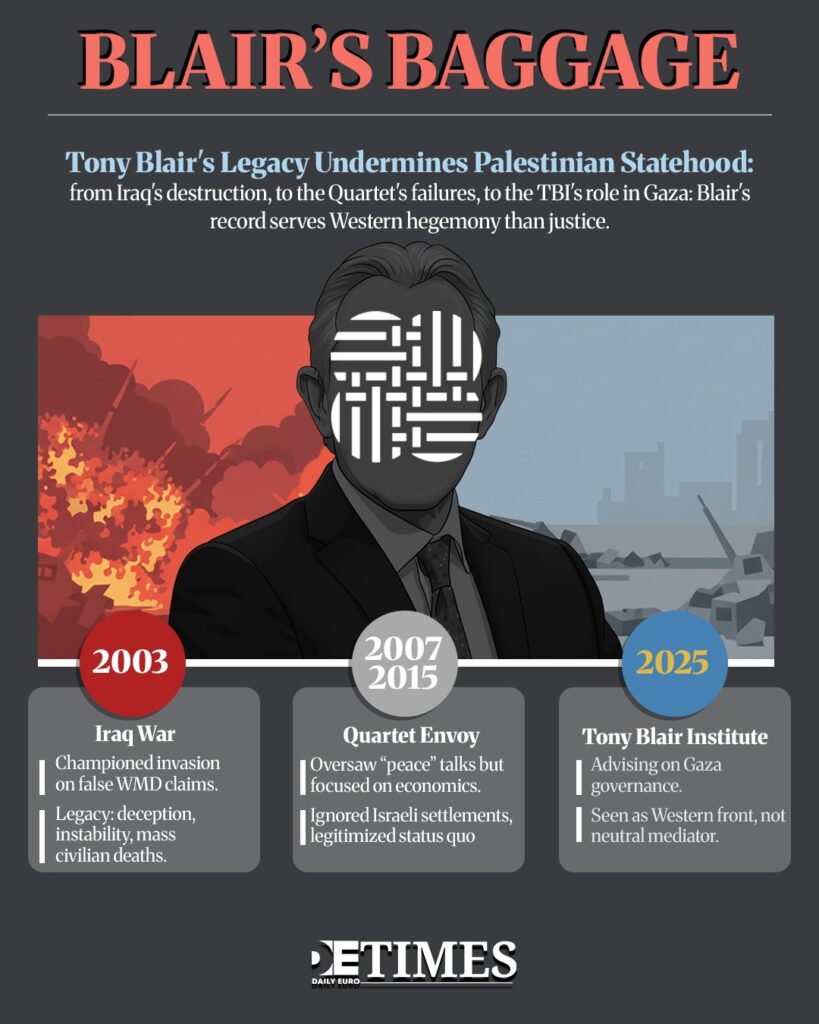On Monday, Trump unveiled his 20-point proposal for Gaza. Netanyahu accepted it right away. Hamas, however, has yet to receive formal written details.
The plan aims to halt the conflict through international oversight. A Board of Peace, co-led by Trump and Blair, would manage Gaza’s rebuilding efforts.
Washington’s Legitimacy Problem
The White House envisions deploying an International Stabilisation Force to Gaza once Hamas disarms. Troops would come from Arab states, while Palestinian experts would run daily affairs.
Yet America’s history casts doubt on this plan. Washington has supported Israeli actions throughout the conflict, making Palestinians skeptical about U.S. promises regarding their land.
Trump’s controversial February idea of relocating Gaza’s population still haunts many. He proposed moving about one million Gazans to Libya. The new plan insists no one would be forced to leave, but such reversals naturally breed mistrust among Palestinians.
Blair’s Baggage Weighs Heavy
Tony Blair carries a difficult legacy.
The Iraq war he championed, based on false intelligence, caused massive loss of life that still pains many in the war-torn country.
From 2007 to 2015, Blair served as the Quartet’s envoy. Palestinians accuse him of enabling settlement growth during that time and blocking moves toward statehood.
His Tony Blair Institute for Global Change now helps design Gaza's governance. Many see him less as a neutral mediator and more as a representative of Western interests.
Palestinians deserve peacekeepers without such controversial histories.

Europe Holds Better Cards
In September’s UN General Assembly, nine European countries recognised Palestine as a state. This group includes France, Belgium, Luxembourg, Malta, Monaco, Andorra, Britain, Canada, Australia, and Portugal.
Earlier recognitions came from Spain, Ireland, Norway, Slovenia, Armenia, Mexico, and several Eastern European nations like Poland, Hungary, and Romania.
These countries bring a moral authority the U.S. lacks. Their recognition shows a real commitment to Palestinian self-rule, giving their engagement greater legitimacy.
Europe could staff oversight bodies with officials Palestinians are more likely to trust than American ones, making acceptance easier.
Economic Control Raises Alarms
The plan calls for a special economic zone with favorable trade rules. International experts would decide how Gaza’s economy is rebuilt. Reconstruction funding would be controlled by the Board of Peace.
This setup feels more like colonial management than genuine autonomy. Outside powers would decide Gaza’s economic future while local voices stay sidelined.
Gaza urgently needs rebuilding after massive destruction—including the loss of over 66,000 Palestinians and ruined infrastructure and hospitals.
But Palestinians should lead how their economy recovers. Foreign experts can support, but not dominate. True partnership is very different from imposed control.
Palestinian Authority Reform Remains Vague
The White House requires reforms to the Palestinian Authority before handing over Gaza — including constitutional changes and elections — but offers no clear timeline.
Netanyahu rejects any PA role in this process. Israeli Finance Minister Bezalel Smotrich publicly declared his hard stance: no PA participation, ever.
The proposal’s vague promises of statehood give little assurance. Conditions could drag on endlessly, leaving Palestinians stuck in limbo under international oversight.
Meanwhile, Palestinians remain caught in uncertainty as others decide their fate.
European Mediators Offer Alternative
Countries recognising Palestine approach negotiations differently. They see Palestinian statehood as a real, legitimate goal—not some distant dream. This changes the conversation fundamentally.
European involvement in peacekeeping forces would balance U.S. influence. Training Palestinian police with trusted instructors is key. Europeans could provide that trust.
Transparent, accountable oversight of reconstruction funds is essential, and European financial bodies operate under strict scrutiny, reducing risks of corruption.
Arab states welcomed the proposal’s outline on Monday, with Egypt and the UAE meeting in Cairo to praise it as a step toward lasting peace.
Yet Arab support alone won’t erase Palestinian skepticism. European countries recognising Palestine can help bridge this trust gap, lending legitimacy Washington cannot provide on its own.
Statehood Cannot Wait Forever
The plan talks about a “credible pathway to Palestinian self-determination and statehood” when “conditions align.” But this language often delays real progress rather than ensuring it.
Self-determination means Palestinians should govern themselves now, not after meeting conditions set by outsiders. International aid should empower them, not replace them.
European nations that recognise Palestine grasp this and could push for actual sovereignty. U.S. plans risk keeping Palestinians in an endless waiting room.
Gaza’s two million residents deserve more than international oversight—they need true control over rebuilding their land. Their home should not become a testing ground for Western policies.
European states positioning themselves as partners—not just administrators—can reshape this balance. Recognition gives them the standing to demand true Palestinian agency.
Trump wants European input on post-war plans. Europe should accept, putting their recognition promises into action. Palestinian statehood cannot remain just words while foreign boards run Palestinian land.
The alternative feels too much like empire wearing humanitarian clothes.
Keep up with Daily Euro Times for more updates!
Read also:
New Pressures on Israel: Trade Sanctions and Abraham Accords Freeze
108 Years Too Late: Palestine and Politics
Qatar Attack Pushes Gulf States Toward European Security






